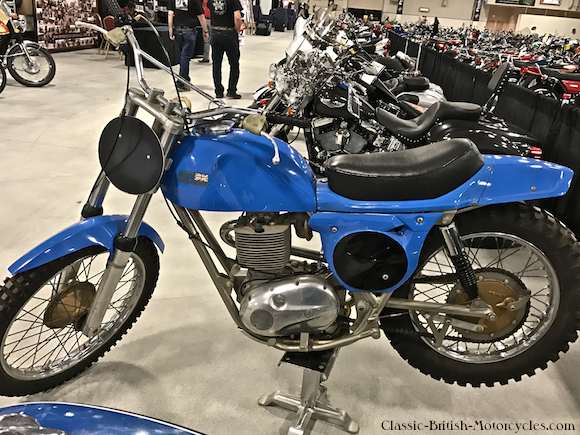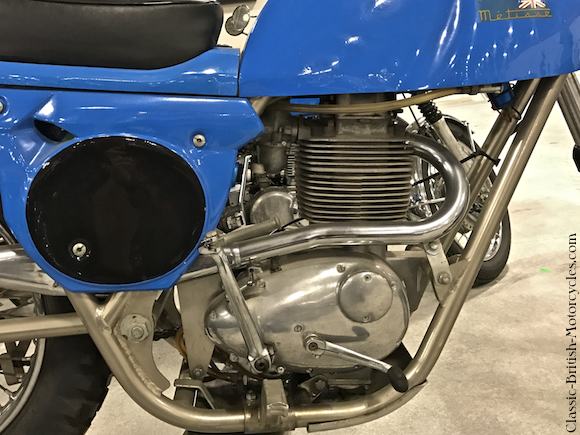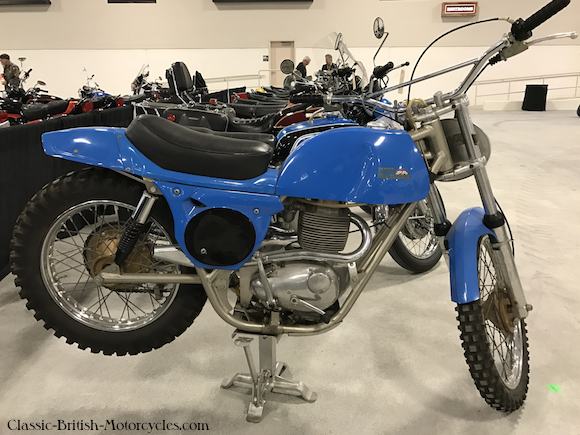1971 Rickman-Weslake
1971 Rickman-Weslake Background
This 1971 Rickman-Weslake is typical of the Rickman dirt bikes running around in the 1960s and early 70s, the result of years of development. After years of racing motocross in the 1950s in England and Europe, brothers Don and Derek Rickman decided to design their own frame. At the time, most dirt bikes were simply stripped-down street bikes, which were too heavy and not ideal for racing in the dirt. They designed their first frame in 1959, the Rickman Metisse MkI (Mark 1). “Metisse” is a rather unsavory French word for mongrel, and refers to the Rickman frame’s ability to accept almost anyone’s engine. They made improvements and came out with the limited-production MkII Metisse in 1960, followed by the full production version, which is still with us today, the MkIII in 1962. By this time, they had perfected the frame’s ability to accept most common engines. From that point on, you might spot a Rickman Metisse with almost any engine (almost always British-built).

BSA 441 VICTOR ENGINE LINEAGE
The MkIII Rickman Metisse frame was designed to accept almost any engine, with the right mounting brackets, which were provided by Rickman. In this example, the classic MkIII Metisse hosts a Westlake-modified, unit-construction BSA 441 Victor single-cylinder engine. The Victor 441 was an evolution of the 250cc 1963 C15 Starfire. This followed the incredibly successful BSA Gold Star which dominated off-road racing for more than a decade. However, BSA’s wholesale conversion of its entire product line over to unit-construction spelled the end for the antiquated pre-unit Goldie. Also, the Lucas magnetos that Gold Stars relied on for spark were being discontinued, requiring a major re-engineering of the engine to accommodate modern electrics. In it’s place was the unit-construction C15, with a mere 250cc. What were they thinking? The 500cc Gold Star made almost 40 horsepower, while this new 250cc machine only made 15 horsepower when introduced. It wasn’t until 1965 that BSA punched it out to 441cc to create the 30hp Victor. It took until 1971 to finally stretch it out to a full 500cc again with the B50-series. Alas BSA built it’s last motorcycle in 1972, so the end was near. By 1970, the 441 Victor engine was fairly well sorted-out, could be made to produce decent power, gobs of low-end torque, and slightly-better-than-average reliability.

1971 Rickman-Weslake Engine
The unit-construction BSA singles never seemed to do as well, on the track or in showrooms, as the pre-unit Gold Star. When then went to unit-construction in 1963, the displacement dropped from 500cc to a max of 441cc in the new BSA Victor. As always, people wanted more, more displacement, more power. So Weslake Engineering designed and produced a new top end for the 441 Victor that bumped displacement up to 500cc again. This was a popular modification for the BSA singles until BSA caught on and bumped the displacement to 500cc themselves in 1970.



